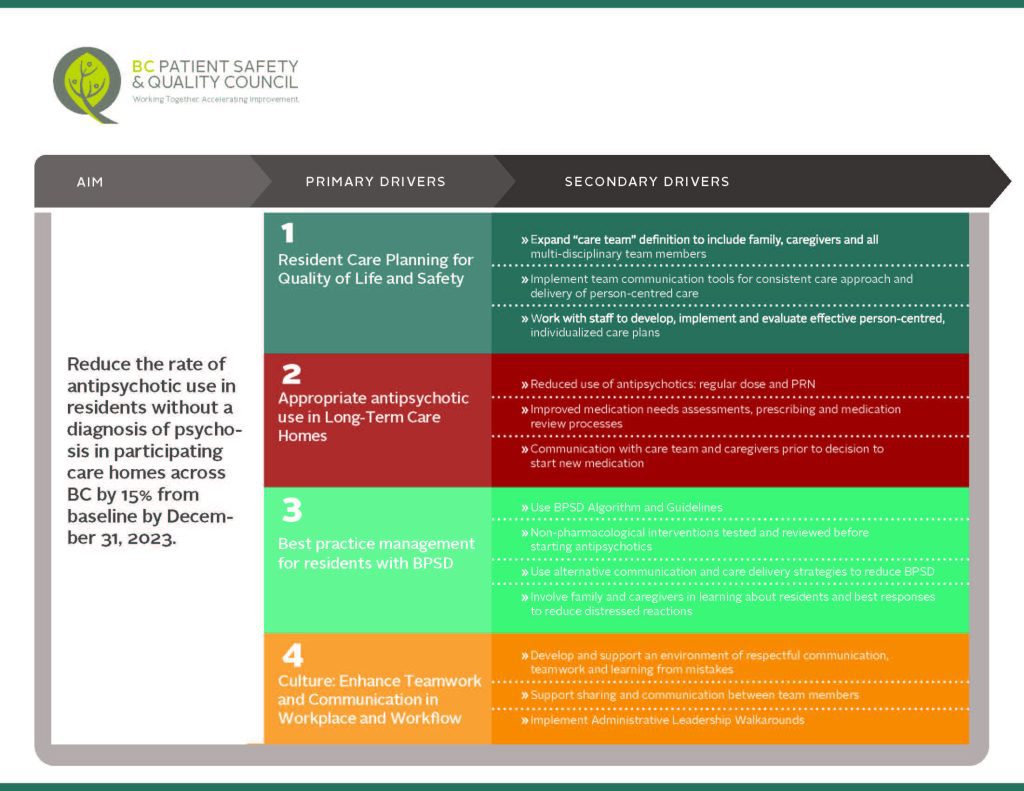Acting on Pandemic Learning Together (August 2020 – December 2021)
The Long-Term Care+: Acting on Pandemic Learning Together (LTC+) program supported over 1,500 teams across Canada, including 222 in BC, with seed funding, coaching and virtual learning through huddles and webinars.
Our work focused on improving collaboration and knowledge transfer by helping teams in BC and the Yukon. We led coaching sessions that aimed to provide just-in-time, facilitated conversations and shared learning based on current needs in the health care system.
Visit Healthcare Excellence Canada for more information on LTC+ Acting on Pandemic Learning Together.
Long-Term Care+: Acting on Pandemic Learning Together
Based on findings from a national qualitative review with family partners and health system leaders across Canada1, the Long-term Care+ program helps organizations prepare for and respond to future COVID-19 waves in six key promising practice areas: preparation; prevention; people in the workforce; pandemic response and surge capacity; providing quality and culturally safe care; and the presence of family. Resources are available for each promising practice area. Be sure to also take a look at the core LTC resources here.
Coaching Sessions
Preparation
Reimagining Care For Older Adults COVID 19
LTC+ Acting on Pandemic Learning Together: Six Promising Practices
CFHI – Identifying Barriers, Facilitators and Recommendations to Long-term Care
BC Long-Term Care: Self-Assessment
Prevention
Quick Reference Guide for COVID-19 Prevention in Long-term Care: SHIP SHAPE
Daily Site COVID-19 Prevention Checklist
LTC+ Acting on Pandemic Learning Together: Six Promising Practices
People in the Workforce
Appropriate Use of Antipsychotics Driver Diagram
Choosing Wisely Toolkit
Aim Statement Worksheet
Reimagining Long-Term Care (3.0): HEC Improvement Charter
Pandemic Response and Surge Capacity
Staffing During the COVID-19 Pandemic
LTC+ Acting on Pandemic Learning Together: Six Promising Practices
Providing Quality and Culturally Safe Care
Choosing Wisely in Long-Term Care
Organizational Review for Health Care
Streamlining Medication Use during COVID-19
Restoring Trust: COVID-19 and The Future of Long-Term Care
The Impact of COVID-19 on Long-Term Care in Canada – The First 6 Months
Presence of Essential Care Partners
Choosing Wisely in Long-Term Care
Organizational Review for Health Care
Streamlining Medication Use during COVID-19
Restoring Trust: COVID-19 and The Future of Long-Term Care
The Impact of COVID-19 on Long-Term Care in Canada – The First 6 Months
Essential Together Tool: Identifying Strengths and Improvements to Reintegrate Essential Care Partners
Policy Guidance for The Reintegration of Caregivers As Essential Care Partners
The Best Visit Possible – A guide for supporting family visits during COVID-19
Staying Apart to Stay Safe
Caring for Caregivers
References
1. Canadian Foundation for Healthcare Improvement and Canadian Patient Safety Institute. Reimagining care for older adults: Next steps in COVID-19 response in long-term care and retirement homes [Internet]; [July 2020][cited May 5, 2021] Available from: https://www.cfhi-fcass.ca/innovations-tools-resources/item-detail/2020/07/20/re-imagining-care-for-older-adults-next-steps-in-covid-19-response-in-long-term-care-and-retirement-homes




